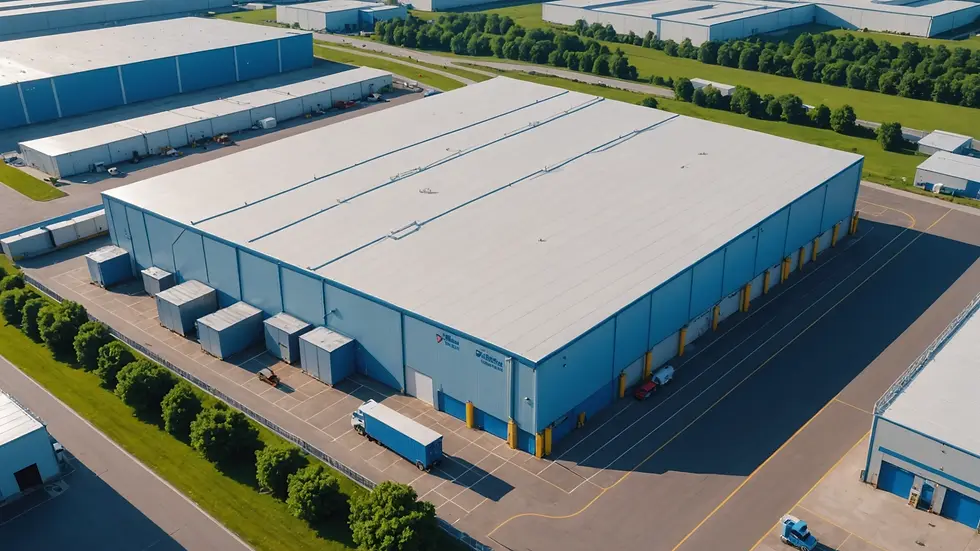Cold Storage Feasibility Study
- Feb 24, 2025
- 4 min read
Updated: May 9, 2025
In today's fast-paced world, cold storage facilities are more important than ever.
They safeguard perishable goods, from fresh produce to pharmaceuticals, by keeping products at the right temperature.
A comprehensive feasibility study not only evaluates the potential of setting up such facilities but also highlights the benefits and challenges involved.
With significant implications for operations, finances, and logistics, this examination is essential for success.
Understanding the Importance of Cold Storage
The demand for cold storage has skyrocketed recently.
According to a report by Grand View Research, the global cold storage market is expected to reach over $312 billion by 2025, growing at a compound annual growth rate (CAGR) of 12.4%.
This increase is driven by the rising consumption of perishable goods and pharmaceuticals that require controlled environments.
Efficient cold storage solutions are vital in maintaining product quality, extending shelf life, and reducing food waste.
It is not just food that benefits from these facilities; sectors like biotechnology and pharmaceuticals rely on cold storage to ensure that sensitive products remain viable and effective.
Key Factors to Consider in a Cold Storage Feasibility Study
When conducting a feasibility study for a cold storage facility, gathering and analyzing several key factors is essential.
1. Market Demand Analysis
Understanding market demand is the foundation of any feasibility study. This requires research into current and future cold storage needs in the chosen area.
For instance, if you’re looking at urban locations, examine population trends and preferences for fresh groceries, which have shown a 30% increase over the last few years.
Investigating the growing demand from local industries, such as those dealing with fresh produce or pharmaceuticals, can reveal significant opportunities.
By synthesizing this data, stakeholders can identify gaps and strategically position their cold storage operations.
2. Location Selection
Choosing the right location is paramount to operational efficiency. Look for sites close to suppliers and key transportation networks.
Facilities located within a 20-mile radius of major highways can reduce distribution costs by up to 40%, according to data from the American Transportation Research Institute.
Also, consider local regulations and environmental factors that may impact operations. Selecting an optimal site ensures better logistics and long-term success.
3. Technology and Infrastructure
Investing in technology can enhance the efficiency of cold storage operations.
Advanced systems such as automated storage solutions and real-time temperature monitoring can lead to energy savings of up to 25%, according to industry studies.
During a feasibility study, evaluating these technologies is vital for minimizing delays and ensuring compliance with health and safety standards.
The more modern the infrastructure, the better positioned the facility will be to compete.
4. Initial Investment and Operating Costs
Performing a detailed financial analysis is vital for evaluating feasibility. Initial investments cover construction, refrigeration equipment, and technological infrastructure.
For example, building a temperature-controlled facility might require upwards of $1 million, depending on size and specifications.
Additionally, consider ongoing operating costs, including energy consumption, maintenance, and labor expenses.
A careful breakdown of these costs provides potential investors a clear picture of sustainability and expected return on investment (ROI).
5. Regulatory Compliance
Adhering to health and safety regulations is crucial for cold storage operations.
Requirements differ based on the types of products being stored, making thorough documentation and adherence to standards essential.
Failing to meet regulations can result in severe penalties, potentially impacting operational continuity.
Stay informed about relevant regulations to streamline operations and maintain a competitive edge in the market.
6. Risk Assessment
Evaluating potential risks is an integral part of any feasibility study.
Cold storage facilities face challenges such as equipment malfunctions, energy cost fluctuations, and supply chain interruptions.
For instance, a report by the Food and Agriculture Organization notes that 1.3 billion tons of food are wasted annually, often due to supply chain inefficiencies.
Identifying these risks and developing strategies to mitigate them helps businesses stay resilient and adaptable.
Developing a Cold Storage Business Plan
Once the feasibility study is complete, developing a detailed business plan is the next step.
This plan should incorporate insights gained from the study, outlining the strategic direction, operational plans, and financial projections.
Address both short-term needs and long-term growth goals to create a roadmap that engages all stakeholders effectively.
Benefits of a Cold Storage Feasibility Study
Conducting a cold storage feasibility study presents numerous advantages:
Informed Decision-Making: Stakeholders acquire essential insights into the market landscape, enabling them to make data-driven decisions.
Resource Allocation: Understanding costs and risks allows for optimal resource distribution, enhancing operational strategies.
Investor Confidence: A well-researched study builds trust with potential investors, showcasing a commitment to thorough planning and risk management.
Sustainability Practices: The findings can lead to practices that boost efficiency and sustainability within cold storage operations.
The Path to Success
Carrying out a cold storage feasibility study is a strategic move that encompasses analyzing market demand, selecting locations, leveraging technology, managing finances, ensuring regulatory compliance, and assessing risks.
With detailed insights from this study, businesses can make smart decisions that enhance efficiency and competitiveness.
In a landscape where cold storage is becoming increasingly important, a thorough feasibility study lays the groundwork for overcoming initial challenges and fosters growth and innovation for the future.
Investing effort into a comprehensive study may lead to significant benefits in the evolving field of cold storage operations.






Comments